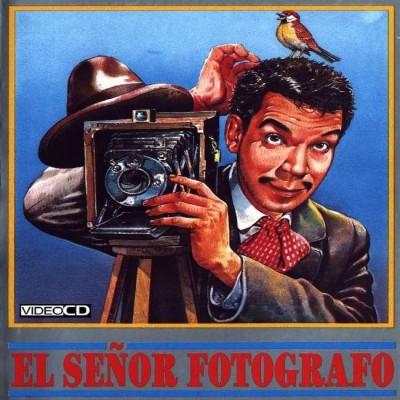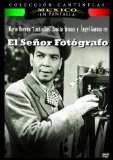| Reviews & Columns |
|
Reviews DVD TV on DVD Blu-ray 4K UHD International DVDs In Theaters Reviews by Studio Video Games Features Collector Series DVDs Easter Egg Database Interviews DVD Talk Radio Feature Articles Columns Anime Talk DVD Savant Horror DVDs The M.O.D. Squad Art House HD Talk Silent DVD
|
DVD Talk Forum |
|
|
| Resources |
|
DVD Price Search Customer Service #'s RCE Info Links |
|
Columns
|
|
|
El señor fotógrafo
The comedies of the iconic Mexican comedian Mario Moreno Reyes, better known as Cantinflas, are a welcome example. Bigger than Chaplin in his own country, Cantinflas was the dominant Mexican film comedian from the late 1930s through the early 1980s - a period of more than 40 years. Americans know him for his role as Passepartout, Phileas Fogg's valet in the 1956 Best Picture-winner Around the World in 80 Days, in which his winning personality was a major asset. (Passepartout is French in the novel but rarely in film adaptations; Jackie Chan played him in the recent remake.) Cantinflas won a Golden Globe as Best Actor (in Spanish-peaking parts of the world, he was billed above British star David Niven) and that success led to another big Hollywood film, Pepe, but it was an infamous if now forgotten box office disaster, despite scads of big-star cameos. Disappointed but not defeated, Cantinflas simply returned to Mexico and resumed his career there.
El señor fotógrafo ("Mr. Photographer," 1953) was made at the height of Cantinflas's popularity, and incorporates Cold War and science fiction elements also popular in American movies of that time. It's an amusing if overlong film. Some of the humor translates but much of it does not, although the gist of the humor is conveyed. Clearly, native Spanish speakers will appreciate Cantinflas's wordplay more than non-speakers, but there's still plenty to enjoy. This Sony release is a mixed bag offering an excellent transfer but extremely ugly subtitles.
The story introduces two separate plots that don't at all intersect until about the halfway point. In the first, foreign communist agents are after the formula Raúl Penagos (Ángel Garasa) has developed for his latest invention: the powerful Z-Bomb. Kidnapped while en route to visit his fiancé, Diana (Rebeca Iturbide), and her father, Roberto Alvírez (Julio Villarreal), a fight breaks out in the backseat of the spies' car. A wayward bullet strikes the driver sending the vehicle over a cliff where it spectacularly crashes. Amazingly (and quite impossibly), Raúl survives the crash but the injury has wreaked havoc on his mind, turning him into an amnesiac madman. He's sent to a sanitarium to recover but escapes.
Meanwhile, Cantinflas is working as a photographer's assistant and dating a pretty manicurist, Chelito (Rosa Arenas). Much of the first-half of the film consists of his antics with various customers, insulting them and stealing their money while the boss (Salvador Quiroz) is away on business.
The two stories finally intertwine when Cantinflas steals flowers from the Alvírez's garden just as the spies arrive. Eventually Cantinflas agrees to look after the professor in the sanitarium, which leads to much comedy where he interacts with various insane patients. Things heat up ever so slightly as the spies make one last effort to steal the valuable formula.
El señor fotógrafo has very little in the way of visual slapstick. Most of the humor is verbal, consisting mainly of Cantinflas insulting everyone, always people of a higher socio-/economical class, including his girlfriend's middle-class mother, who nonetheless treats him courteously. This steady stream of insults has led some to liken Cantinflas to Groucho Marx, though personality-wise he's much closer to Groucho's brother Chico, the lazy, uneducated, womanizing, gambler-shyster - all qualities shared by Cantinflas.
It appears much of the comedian's working class appeal lay in the character's ability to overcome a lack of education and (in this case) implied illiteracy. Though uneducated he bullshits his way through conversations - usually with a lot of untranslatable fast-talking gobbledygook.
Some of this humor is pretty universal; the scenes at the photo studio are funny, for instance. He struggles with the equipment, insults an ugly woman who wants her picture taken, tries to seduce a pretty young bride who arrives with a short, much older husband. Some of the verbal humor also translates: when his boss advises Cantinflas to get up earlier in the morning he protests, "The sun comes up at a very inconvenient time for me." And so on. However, at least 30% of the humor can only be inferred by the English subtitles.
Ultimately, Cantinflas is such a lazy, irresponsible, and dishonest bum it's a testament to the comedian's skill that the character somehow remains likeable and charming (again like Chico Marx).
The rest of the cast is good, with attractive Venezuelan actress Arenas a good match for the comedian. (Arenas later became associated with a series of popular Mexican horror films, including the Aztec Mummy trilogy, The Witch's Mirror, and The Curse of the Crying Woman, all available on DVD.) The film was apparently co-produced by Columbia Pictures, which had a long association with Cantinflas. I'm not familiar with the particulars, but possibly Columbia wanted to use funds tied up in Mexico while acquiring distribution rights to popular comedies that could generate income within Spanish-speaking communities in the United States. In any case after Cantinflas's death in 1993 a long legal battle ensued between the Hollywood company and the comedian's son, with the former eventually awarded rights to 34 features, including this one.
Video & Audio
El señor fotógrafo is presented in its original full frame format (the packaging says 1.85:1 anamorphic widescreen, but this is incorrect), the black and white production looking remarkably sharp and free of damage and wear, unusual considering the general poor state of Mexico's classic cinema library.
Despite the complete absence of Extra Features, the disc would get an unqualified recommendation were it not for the extremely ugly subtitles, which more closely resemble closed-captioning: yellow text over blocky black backgrounds that slightly obscure the picture behind it. Some have found this subtitling ruinous; I dislike it but after a few minutes felt it was not a major distraction. (The bumblebee yellow font bothered me more than the black backgrounds.) Spanish speakers have the option of turning these off. The Dolby Digital mono audio is fine; there are no alternate language or additional subtitle options.
Parting Thoughts
What might be a classic comedy to Spanish speakers loses something in translation, but even without being able to catch all its subtleties I found El señor fotógrafo interesting and enjoyable. Recommended.
Stuart Galbraith IV's latest audio commentary, for AnimEigo's Musashi Miyamoto DVD boxed set, is on sale now.
|
| Popular Reviews |
| Sponsored Links |
|
|
| Sponsored Links |
|
|
| Release List | Reviews | Shop | Newsletter | Forum | DVD Giveaways | Blu-Ray | Advertise |
|
Copyright 2024 DVDTalk.com All Rights Reserved. Legal Info, Privacy Policy, Terms of Use,
Manage Preferences,
Your Privacy Choices | |||||||
















